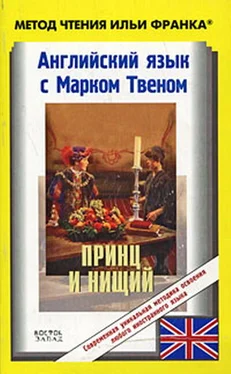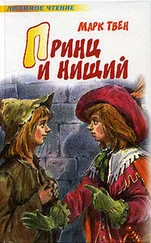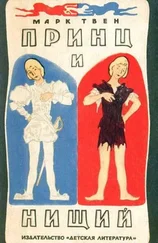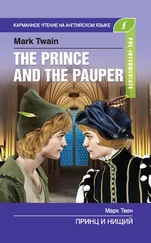Every now and then (постоянно: «каждое сейчас и тогда») rose the cry (поднимался крик; to rise — подниматься), 'A largess (даров)! a largess (даров; largess(e) — щедрость; щедрый дар, вознаграждение)!' and Tom responded by scattering (и Том отвечал разбрасыванием) a handful of bright new coins (пригорошни ярких новеньких монет) abroad (далеко) for the multitude to scramble for (чтобы толпа дралась за них: «для толпы, чтобы драться за»).
The chronicler says (летописец говорит), 'At the upper end of Gracechurch Street (на верхнем конце улицы Грейсчерч), before the sign of the Eagle (перед вывеской орла), the city had erected a gorgeous arch (город воздвиг великолепную арку), beneath which was a stage (под которой были помост), which stretched from one side of the street (который протянулся с одной стороны улицы) to the other (на другую). This was a historical pageant (это была историческая картина), representing the king's immediate progenitors (представляющая ближайших предшественников короля). There sat Elizabeth of York (вот сидела Елизавета Йоркская; to sit — сидеть) in the midst of an immense white rose (в середине огромной белой розы), whose petals (чьи лепестки) formed elaborate furbelows (образовывали искусно сделанные оборки) around her (вокруг нее); by her side (рядом с ней: «у ее бока») was Henry VII (был Генрих Седьмой), issuing out of a vast red rose (выдающийся из громадной алой розы), disposed in the same manner (расположенной в такой же манере); the hands of the royal pair (руки царственной пары) were locked together (были сцеплены вместе), and the wedding-ring (и обручальное кольцо) ostentatiously displayed (демонстративно выставлены напоказ). From the red and white roses (из алой и белой роз) proceeded a stem (тянулся стебель), which reached up to a second stage (который дотягивался вверх до второго уровня), occupied by Henry VIII (занятого Генрихом Восьмым), issuing from a red-and-white rose (выступающим из ало-белой розы), with the effigy of the new king's mother (со статуей матери нового короля), Jane Seymour (Джейн Сеймур), represented by his side (выставленной рядом с ним: «у его бока»). One branch sprang from this pair (одна ветка произрастала из этой пары), which mounted to a third stage (которая поднималась на третий уровень), where sat the effigy (где восседала статуя; to sit — сидеть) of Edward VI himself (самого Эдуарда Шестого), enthroned (усаженного на трон) in royal majesty (в королевском величии); and the whole pageant (и вся картина) was framed with wreaths of roses (была обрамлена венками из роз), red and white (алых и белых).'
idol [`aid(ə)l], menial [`mi:nıəl], beneath [bı`ni:θ]
In Fenchurch Street a 'fair child, in costly apparel,' stood on a stage to welcome his majesty to the city. The last verse of his greeting was in these words:
Welcome, O King! as much as hearts can think;
Welcome again, as much as tongue can tell —
Welcome to joyous tongues, and hearts that will not shrink;
God thee preserve, we pray, and wish thee ever well.
The people burst forth in a glad shout, repeating with one voice what the child had said. Tom Canty gazed abroad over the surging sea of eager faces, and his heart swelled with exultation; and he felt that the one thing worth living for in this world was to be a king, and a nation's idol. Presently he caught sight, at a distance, of a couple of his ragged Offal Court comrades — one of them the lord high admiral in his late mimic court, the other the first lord of the bedchamber in the same pretentious fiction; and his pride swelled higher than ever. Oh, if they could only recognize him now! What unspeakable glory it would be, if they could recognize him, and realize that the derided mock king of the slums and back alleys was become a real king, with illustrious dukes and princes for his humble menials, and the English world at his feet! But he had to deny himself, and choke down his desire, for such a recognition might cost more than it would come to; so he turned away his head, and left the two soiled lads to go on with their shoutings and glad adulations, unsuspicious of whom it was they were lavishing them upon.
Every now and then rose the cry, 'A largess! a largess!' and Tom responded by scattering a handful of bright new coins abroad for the multitude to scramble for.
The chronicler says, 'At the upper end of Gracechurch Street, before the sign of the Eagle, the city had erected a gorgeous arch, beneath which was a stage, which stretched from one side of the street to the other. This was a historical pageant, representing the king's immediate progenitors. There sat Elizabeth of York in the midst of an immense white rose, whose petals formed elaborate furbelows around her; by her side was Henry VII, issuing out of a vast red rose, disposed in the same manner; the hands of the royal pair were locked together, and the wedding-ring ostentatiously displayed. From the red and white roses proceeded a stem, which reached up to a second stage, occupied by Henry VIII, issuing from a red-and-white rose, with the effigy of the new king's mother, Jane Seymour, represented by his side. One branch sprang from this pair, which mounted to a third stage, where sat the effigy of Edward VI himself, enthroned in royal majesty; and the whole pageant was framed with wreaths of roses, red and white.'
This quaint and gaudy spectacle (это необычное и пышное зрелище) so wrought upon the rejoicing people (так подействовало на радующихся людей; wrought — устар. от to work — работать), that their acclamations utterly smothered (что их восклицания совершенно заглушили; to smother — душить, замять) the small voice of the child (маленький = слабый голос ребенка) whose business it was (чьим делом было) to explain the thing (разъяснить эту вещь = картину) in eulogistic rhymes (в хвалебных стихах). But Tom Canty was not sorry (но Том Кэнти не жалел об этом: «не был сожалеющим»); for this loyal uproar (ибо этот верноподданный гам) was sweeter music to him than any poetry (был сладчайшей музыкой для него, чем любая поэзия), no matter (неважно: «никакого значения») what its quality might be (каким его качество могло быть). Whithersoever Tom turned (куда бы Том не обратил) his happy young face (свое счастливое юное лицо), the people recognized the exactness (люди признавали точность) of his effigy's likeness to himself (сходства его статуи с ним самим), the flesh-and-blood counterpart (двойником из плоти и крови); and new whirlwinds of applause burst forth (и новые вихри аплодисментов взорвались; to burst forth: «взорваться вперед»).
Читать дальше
Конец ознакомительного отрывка
Купить книгу




![Марк Твен - Принц и нищий [Издание 1941 г.]](/books/148799/mark-tven-princ-i-nichij-izdanie-1941-g-thumb.webp)







